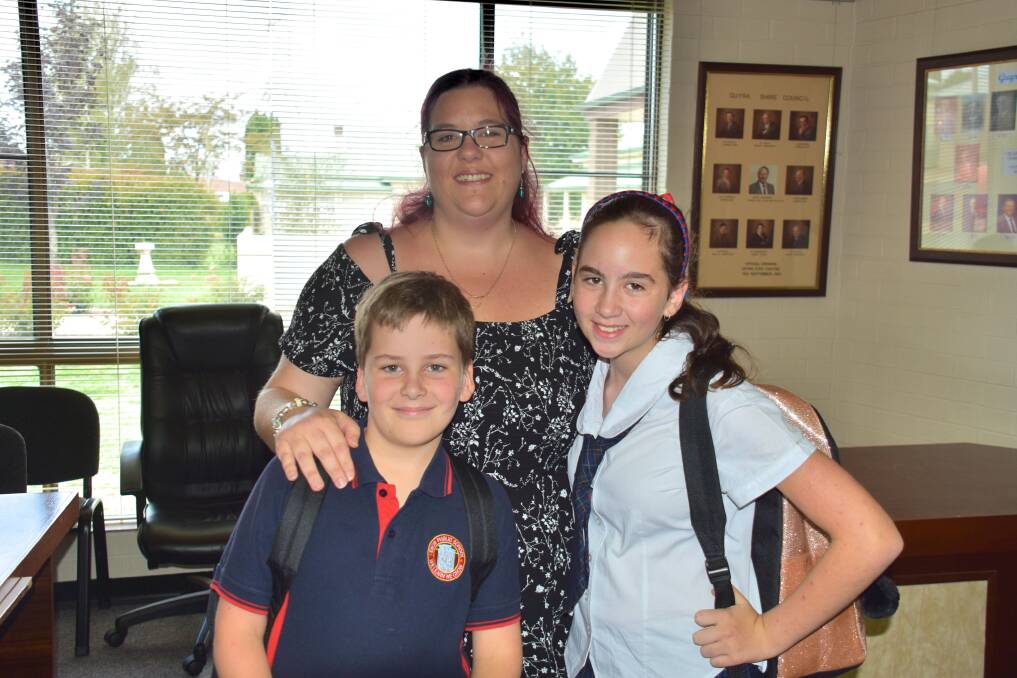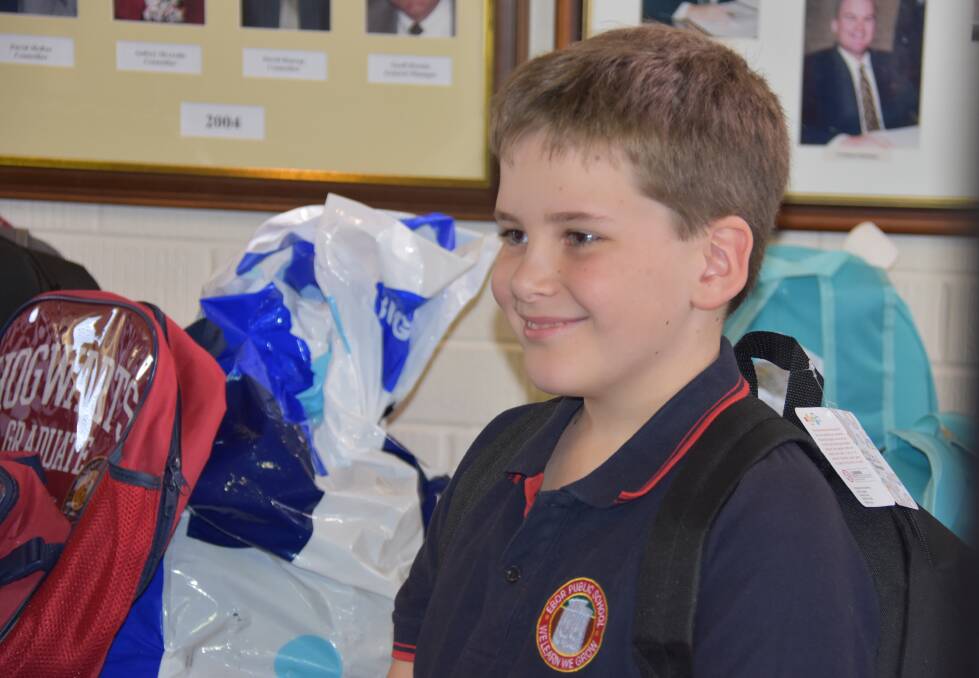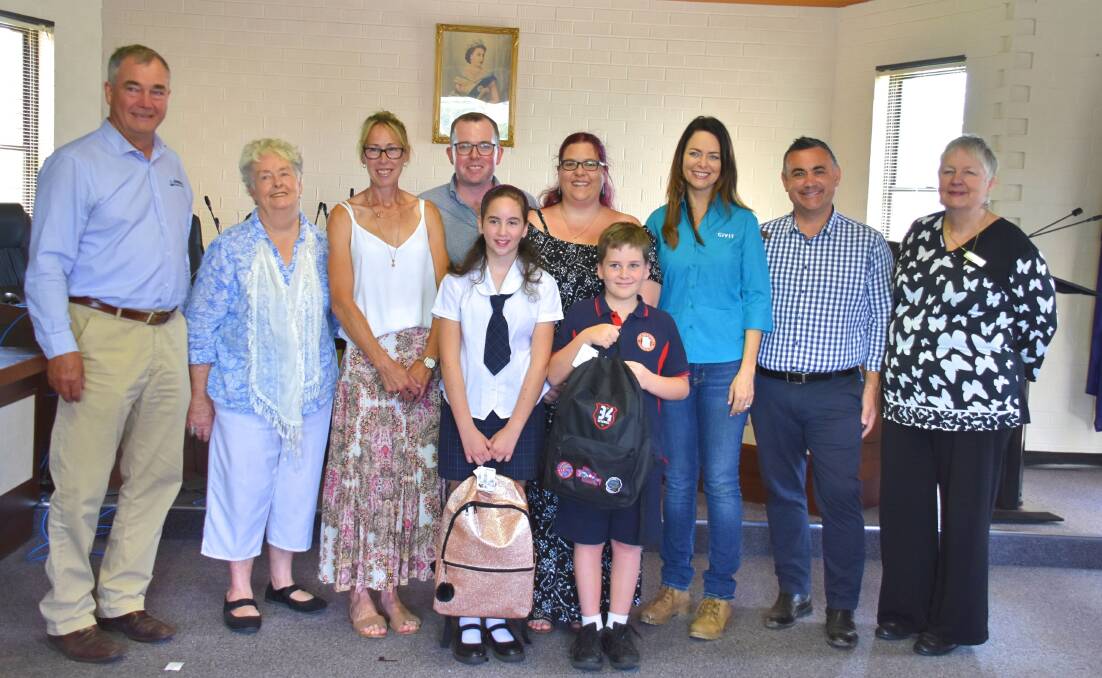
The start of the school year will be easier for 18 families in the fire-affected village of Ebor. The state government has partnered with not-for-profit organisation GIVIT to provide school uniforms, backpacks, and supplies.
Subscribe now for unlimited access.
$0/
(min cost $0)
or signup to continue reading
"For a lot of families, it will be very helpful to have that cost taken out of starting school," Ebor mother Shantel Brauer said. "We're very thankful for the GIVIT program."
Her children Aria (12, in Year 6) and Wyatt (9 turning 10, in Year 4) chose their backpacks at the Guyra council chambers on Thursday.
Aria said she loved hers - particularly since it was donated for a good cause. "They're very comfy," Wyatt said.
"This is one less burden for those families," NSW deputy premier John Barilaro said, visiting the region in his new role as minister for disaster recovery. "It provides help at a tangible, local level."
READ ALSO:
- How an Ebor woman coped with cancer, drought, and fires
- LLS rates waived again this year for region's farmers
- Water Pressure podcast: Myth busters edition
- Canberra residents evacuated as bushfires merge at national capital: Live updates
- Calling on youth: Nominations open for 2020 NSW Youth Advisory Council
The backpacks contains every single thing kids need for school, GIVIT founder and director Juliette Wright said, including lunch boxes, a ruler, rubbers, erasable pens, and exercise books. Clarks Shoes have also donated a pair of shoes for each child.

"Simple things make a massive difference to people's lives," Ms Wright said. "Making sure that every kid has exactly the same stuff, no one has more or less than each other, makes a difference. Kids want to fit in; they don't want to stand out."
GIVIT's free online platform makes giving easy by allowing organisations to see exactly vulnerable community members need.
Mrs Brauer liaised between Ebor Public School principal Lee Rose and Armidale Regional Council in her roles as president of the village's community groups and member of the P&C. She was put onto the GIVIT program by council's program leader of community services, Sally Schofield.
"People don't realise how close to the village [the fire] came," Mrs Brauer said. "It was right up the back [of our property]. My next-door neighbour had a fire in their yard, down our street, right up at the end of it. Friends of mine lost a lot of property within Ebor."
Her family was lucky; they weren't hit by the fires, but they were evacuated.

"We watched it as it was coming up the gorge," Mrs Brauer said. "You could see the smoke from our place. It was very scary."
Juliette Wright and her husband live in Brisbane, but also have a property at Ebor, the 1300 ha 'The Plains'.
"It's my favourite place," she said. "I absolutely love Ebor. Before the drought, the people who used to own the farm said they would put a seed in the ground, and they didn't have to water it. So it's been a rude shock for the people of Ebor in the last couple of years for the drought to creep in and then to be hit by the fires. It's just devastating."
Her property wasn't burnt either. "No, thank God! But it was close."
She was glad to be able to help the community. "Ebor and this whole region is just so incredibly friendly; everybody wants everybody else to be supported. We've had the generosity of our neighbours to help us with medicine for the cows when we've needed it urgently. The moment we arrived, we've just felt incredibly welcome."

GIVIT has also provided $5000 worth of vouchers to buy goods from Guyra businesses, including clothing shops and fuel stations. These will be distributed through local neighbourhood centre, the Hub at Guyra.
Northern Tablelands MP Adam Marshall said this was a way for locals to receive assistance quietly while maintaining their dignity.


